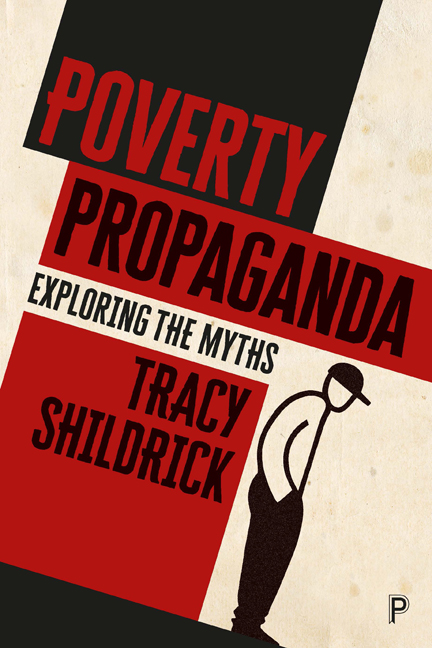Book contents
- Frontmatter
- Contents
- List of abbreviations
- Acknowledgements
- One Introduction
- Two Poverty propaganda
- Three Poverty and lived experiences
- Four Poverty, labour markets and ‘poor work’
- Five Poverty, social class and social immobility
- six Poverty: discrimination, stigma and shame
- Seven Poverty propaganda and reproduction of poverty, power and inequality
- Eight Conclusions
- References
- Index
Five - Poverty, social class and social immobility
Published online by Cambridge University Press: 09 April 2022
- Frontmatter
- Contents
- List of abbreviations
- Acknowledgements
- One Introduction
- Two Poverty propaganda
- Three Poverty and lived experiences
- Four Poverty, labour markets and ‘poor work’
- Five Poverty, social class and social immobility
- six Poverty: discrimination, stigma and shame
- Seven Poverty propaganda and reproduction of poverty, power and inequality
- Eight Conclusions
- References
- Index
Summary
Introduction
Class distinctions do not die; they merely learn new ways of expressing themselves. Each decade we shiftily declare we have buried class; each decade the coffin stays empty. (Richard Hoggart, 1989)
The greatest injustice in Britain today is that your life is still largely determined not by your efforts and talents but by where you come from, who your parents are and what schools you attend. (Conservative and Unionist Party, 2017)
“I wanted to be a forensic scientist when I left school (laughs) …//… I ended up doing a childcare course. I got an apprenticeship in a private nursery when I first left school. Just an apprenticeship in a private nursery but I only did that for a bit, then I left to take full time care of my sister.” (Trudy, aged 25, Teesside interviewee in Shildrick et al , 2012b)
The book so far has detailed examples of poverty propaganda and talked about contemporary experiences of poverty, yet nothing has explicitly been said about social class. Yet it is questions about social class that lie at the heart of much of the discussion in this book. Peter Townsend, one of the foremost researchers on poverty in the last century, was interested in the ways in which social class and status differences in society were organised in order to benefit some in society at the expense of disadvantaging others (Townsend, 1975). Social class can be measured in any number of different ways, but at its heart is a question of economics. There is little question that since the 1970s social class has become a complex, confused and contested concept, with much debate over its meaning as well as its continued relevance. In both political and popular arenas the concept has become largely redundant amid social changes that have, on the surface at least, appeared to make the concept of class less vital. We will see below that this idea has been supported by a neoliberal agenda that prioritises the promotion of free choice along with the individualisation of life chances, experiences responsibilities (Beck, 2002).
Access to life opportunities is to a large degree still determined by social class background, but this unevenness of opportunity – and who benefits from this uneveness – is deliberately overshadowed by a focus on the opportunities themselves.
- Type
- Chapter
- Information
- Poverty PropagandaExploring the Myths, pp. 87 - 112Publisher: Bristol University PressPrint publication year: 2018



